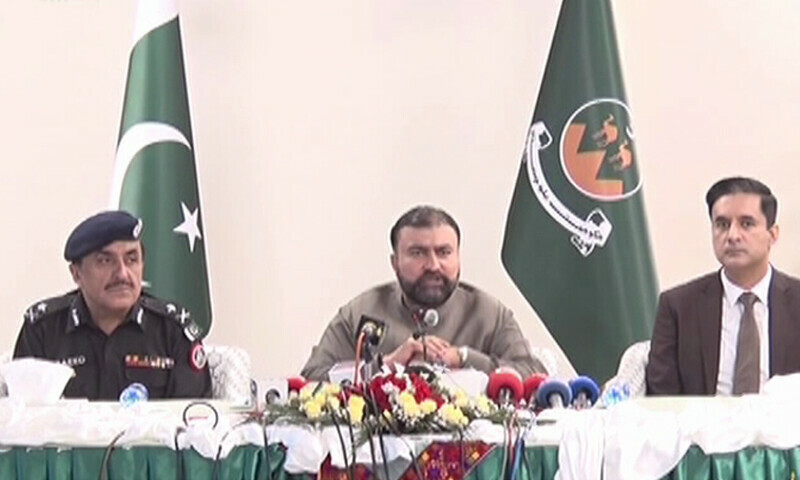Balochistan Chief Minister Sarfraz Bugti on Monday said security agencies had arrested an alleged “would-be suicide bomber” as they foiled a terrorist attack on Independence Day.
The security situation in Balochistan has worsened in recent months, as terrorists, long involved in a low-level insurgency, have stepped up the frequency and intensity of their attacks. The banned so-called Balochistan Liberation Army (BLA), in particular, has adopted new tactics to inflict higher casualties and directly target Pakistani security forces.
Addressing a press conference in Quetta alongside other top officials, the chief minister said: “On August 14, the suicide bombers had planned to target innocent citizens who were celebrating Independence Day.”
He commended the security agencies, the Balochistan Counter-Terrorism Department, and the police for saving the province from “huge destruction”.
CM Bugti then aired a recorded statement of a highly educated man who had been arrested for his alleged involvement in facilitating terrorists.
In the video, the man, working as a lecturer at Balochistan University, confessed to having links with terrorist groups. After airing the man’s statement, CM Bugti noted that the information being shared was “not in great detail”, so as not to sabotage ongoing investigations.
He recalled that the Nov 2024 Quetta Railway Station bombing, in which “32 precious lives were lost and 50-plus were injured”, and explained how the arrested lecturer was allegedly involved in facilitating the attack.
“He (the lecturer) had him (the suicide bomber) sit on a motorcycle and dropped him near the railway station, and after that, handed him over to another handler about one kilometre away from the railway station,” Bugti said.
Stating that some attributed the Balochistan militancy issue to “deprivation,” the chief minister rhetorically asked: How are these people deprived?
“The mother is still receiving a pension which means she was a government employee, his wife is also a government employee, he himself is a Grade-18 [officer], has studied and done a PhD on Pakistani scholarship, brother is an employee in Reko Diq [project], which means he was not deprived in any way,” Bugti added.
CM Bugti explained that the BLA’s Majeed Brigade operated in “three to four tiers” — “footsoldier” being the lowest and comprising uneducated people, the second tier using women for targeted killings in cities, and the top-most “sophisticated” tier that the lecturer was a part of.
“This is the first time security forces have accomplished such a big success, of arresting a leader of Majeed Brigade’s ‘sophisticated’ tier,” Bugti said.
He said that the narrative about “deprived people engaging in such acts,” which he noted was also echoed in a multi-party conference (MPC) in Islamabad yesterday, was “an attempt to legitimise this entire fight against Pakistan”.
In a gathering organised by the Awami National Party on Sunday, Jamiat Ulema-i-Islam-Fazl (JUI-F) chief Maulana Fazlur Rehman questioned the government’s writ in Khyber Pakhtunkhwa’s tribal areas. Balochistan National Party-Mengal and Jamaat-i-Islami were among the various parties that attended the moot.
Bugti mentioned that when the CTD went to arrest the “would-be suicide bomber”, his neighbours intervened and tried to resist the arrest.
“I want to tell the people of Balochistan: we filed an FIR (first information report) against all of them, every one of them is arrested.
“But please, stay away from these people. If you stay close to them, you will also be treated like a suicide bomber,” he advised.
“This has nothing to do with unparalleled or underdevelopment,” Bugti said, again criticising yesterday’s MPC for terming violence in KP as terrorism but describing the militancy in Balochistan as “something else.”
“We are not in favour of collective punishment. But the Balochistan government will also see when relatives of those who join these groups do not alert their security agencies, political leadership or tribal elders, which means the entire family is involved,” Bugti warned.
Responding to reporters’ queries, the Balochistan CM, while asserting he did not want to “go into any blame game”, said it seemed the previous provincial governments had divorced themselves from the issue.
Pointing out the listing of individuals in the Fourth Schedule, Bugti stressed the importance of further strengthening the CTD’s Special Branch for improved intel.
“We have investigated 2000 to 2,500 people, especially government employees. Some were innocent and their names were from the Fourth Schedule, some were sent explanation letters, some were suspended, some were terminated.
“We will not spare. We’ll fight this war, in warfare and lawfare too,” CM Bugti asserted.
“Those who wish to talk to us will find our doors open,” the chief minister said, urging all political parties to stand against terrorism and to acknowledge the state’s sacrifices in countering it.
‘Betrayal of state’
In his statement, the lecturer provided details of his alleged links to terrorist outfits, saying that in 2020, he was introduced to three individuals affiliated with “an organisation”, two of whom were later killed. He said that two men, Dr Habetan and Feh Khaliq, got him to join a militant group and had him meet with a man named Basheerzai.
He said that all introductions were carried out through the Telegram messaging app, known for privacy features like secret chats, self-destructing messages, and anonymity.
The lecturer recalled that, on the instructions of Dr Habetan and Feh Khaliq, he had assisted the group by providing shelter to a militant injured in a clash in Kalat and stated that he had handed the man over to another individual before the incident, and that the militant died the next day in a railway suicide bombing.
He further recounted another incident in which he sheltered a man for seven to eight days, who was later intended to be used in an August 14 attack. The lecturer also confessed that he had purchased a pistol, which was subsequently used in targeting security forces and government employees.
The man expressed regret over his actions, admitting that they were unlawful and amounted to a betrayal of the state.
